 Following the US Supreme Court’s decision to overturn the right to an abortion in the Dobbs v. Jackson Women’s Health Organization decision, many US states’ trigger laws banning abortions in almost all circumstances have or are about to come into effect. Shyam K. Sriram, Maddie Sontag, Caroline Corker, and Emma Randich discuss states’ use of trigger laws to restrict abortion and how they show the wide-reaching effects of overturning of Roe v Wade in the US.
Following the US Supreme Court’s decision to overturn the right to an abortion in the Dobbs v. Jackson Women’s Health Organization decision, many US states’ trigger laws banning abortions in almost all circumstances have or are about to come into effect. Shyam K. Sriram, Maddie Sontag, Caroline Corker, and Emma Randich discuss states’ use of trigger laws to restrict abortion and how they show the wide-reaching effects of overturning of Roe v Wade in the US.
The June 24th, 2022 Supreme Court decision overturning Roe v Wade has reignited debate surrounding abortion rights in America, as the country erupted in both protest and celebration. President Biden reflected on the “sad day for the Court and for the Country,” insisting that this decision was a “tragic error.” Meanwhile, former Vice President Pence and former President Trump celebrated the decision, referring to it as “courageous and correct.”
In his concurrent opinion, Justice Clarence Thomas contended that the overrule of Roe constitutes a reconsideration of the other cases that are built upon “substantive due process” established by the Fourteenth and Fifteenth Amendments. Issues that are threatened with Thomas’ statement include the right to contraception, the right of same-sex couples to have consensual and private relations, as well as the freedom of same-sex couples to get married.
Trigger laws
Several state legislatures have been prepared for the overturning of Roe v Wade for almost two decades via what are known as ‘trigger laws’. Such laws are enacted by a state legislature and only come into force if there is an external change, such as a Supreme Court decision. Trigger laws are not new; in fact, they exist for other policy scenarios like Medicaid. Nine states – Arizona, Arkansas, Illinois, Indiana, Michigan, Montana, New Hampshire, New Mexico, and Washington – will end their Medicaid expansions automatically if the federal matching rate for expansion enrollment also falls. Unlike the abortion trigger laws, however, this action will not be triggered by a Supreme Court decision.
Thirteen states currently have trigger bans that either immediately ban abortion or will effectively ban it in the coming weeks with the Dobbs v. Jackson Women’s Health Organization ruling. Most of these thirteen trigger bans require action by a state’s attorney general, governor, or legislature to certify the Supreme Court ruling. After this certification, usually within 30 days, the trigger ban will go into effect (for example, Tennessee and Texas). On top of this, there are nine more states that are projected to restrict or ban abortion, thus totaling twenty-two states with prohibitive abortion policies in the near future.
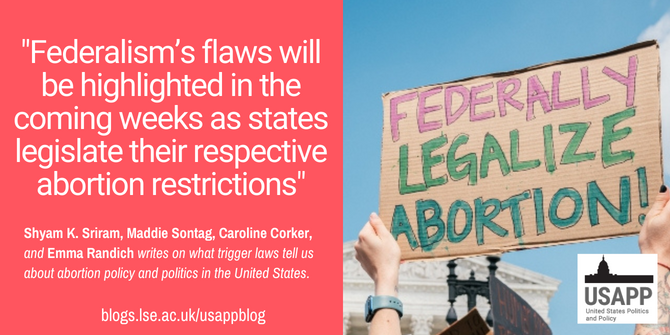
Photo by Gayatri Malhotra on Unsplash
Visualising the language of trigger laws
We generated two word-clouds to visualize what the laws of these thirteen “trigger states” look like. The first cloud (Figure 1) illustrates that in the thirteen states with trigger laws, the most common phrases in their abortion-related code are “woman,” “pregnant,” “court,” “unborn,” “person,” and “physician.” The second cloud (Figure 2) is a visualization of the specific trigger-related legislation, and it is obvious that these Roe triggers are focused on devolving power from the federal government to the states. The most common phrases in the second cloud are “state(s),” “authority,” “supreme,” “court,” and “prohibit.”
Figure 1 – Word Cloud of Abortion Legislation
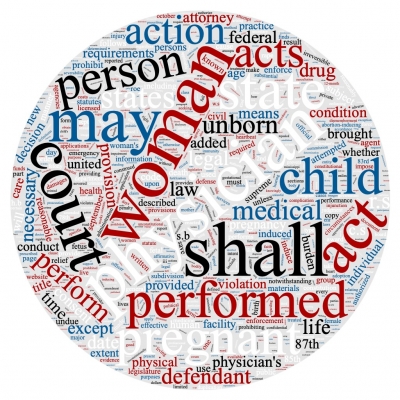
Figure 2 – Word Cloud of Trigger-Related Legislation
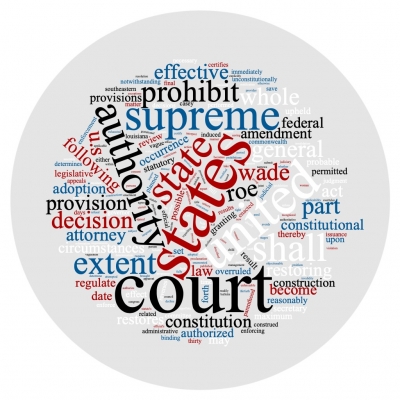
Drawing on individually-collected data, Planned Parenthood, and the work of the Guttmacher Institute, Figure 3 shows the current scenario of state policies. Thirty-nine states include trigger bans, pre-1973 bans, and restrictions ranging from the requirement of parental consent to lacking insurance coverage. What is also important to note is that many of these trigger bans are recent and were signed into law during or following the Trump administration: Wyoming (2022); Texas and Kentucky (2021); Utah and Idaho (2020); North Dakota, Arkansas, Tennessee, and Missouri (2019); and Louisiana (2018). There are only eleven states in the country with minimal restrictions on abortion; one of which is Illinois, which not only is one of the most accessible states for abortion, but also one that removed its own trigger ban in 2018.
Figure 3 – State Abortion Laws
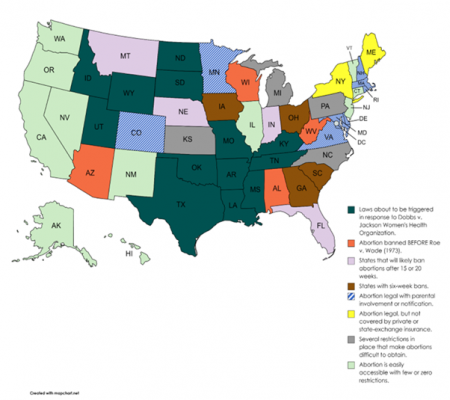
Our analysis of state legislatures and their laws yielded other interesting points of consideration. All thirteen states with trigger laws have a Republican majority in their state legislatures. Of these thirteen states, only two, Louisiana and Kentucky, have Democratic governors. Interestingly, these two states are the only ones to have identical trigger language in their statutes. Most of these states had exceptions including the life of the mother and rape, but Mississippi is the only state that does not allow victims of incest to be exempt from the law.
Nearly 36 million American women of reproductive age would lose access to abortion under these new laws and in many states would risk getting in legal trouble for travelling to another state to pursue an abortion. In a current work-in-progress, authors David S. Cohen, Greer Donley and Rachel Rebouché insist that “the interjurisdictional abortion wars are coming;” federalism’s flaws will be highlighted in the coming weeks as states legislate their respective abortion restrictions.
Please read our comments policy before commenting.
Note: This article gives the views of the authors, and not the position of USAPP – American Politics and Policy, nor the London School of Economics.
Shortened URL for this post: https://bit.ly/3yxaX2c
About the authors
 Shyam K. Sriram – Canisius College
Shyam K. Sriram – Canisius College
Shyam K. Sriram is an assistant professor in the Department of Political Science at Canisius College.
Maddie Sontag – Gonzaga University
Maddie Sontag is an undergraduate student at Gonzaga University.
Caroline Corker
Caroline Corker is an independent scholar based out of Washington, D.C.
Emma Randich
Emma Randich is an independent scholar based out of Olympia, Washington.



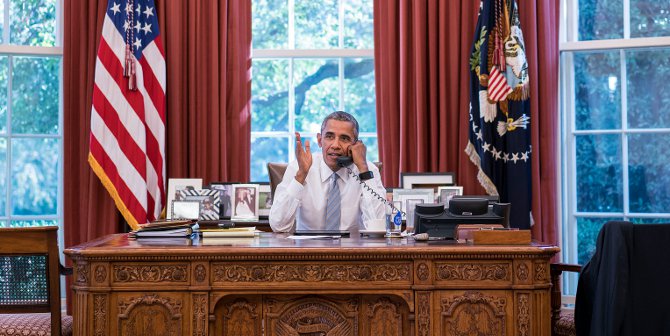



I believe that abortion should be legal and should be pro-choice. No woman should have to live with a baby that was unwanted at the time, I understand that you are taking an innocent life away from a child who didn’t get a say in it. But no woman should have to live with a baby that came from a man that they will never meet again. Especially if said woman has to try and raise it by herself without the funding, in my opinion, abortion should stay legal with the choice of the parents without getting punished by lawmakers.